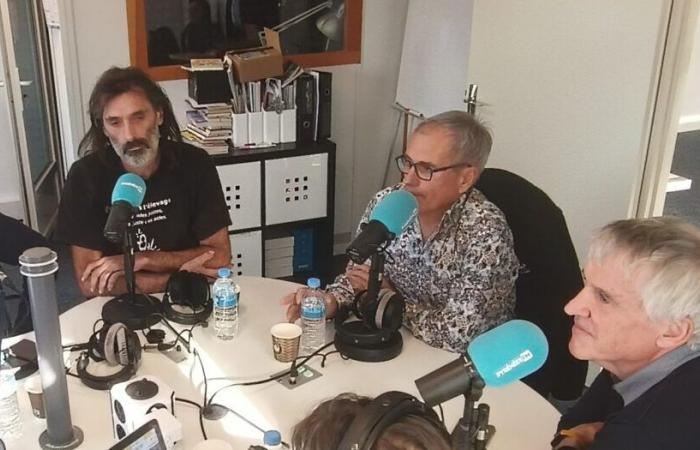The elections for the Ariège Chamber of Agriculture will close on January 31. To assert their positions, the candidates participated in a debate on the air of Pyrenees FM on Monday January 20. Among the guests, Hervé Peloffi (FDSEA), Philippe Lacube (outgoing president), and David Eychenne (Confédération Paysanne). Who will take the reins of the Chamber of Agriculture for the next 6 years? Response from February 6.
For the agricultural world, the start of 2025 is marked by the election of the Chamber of Agriculture. Voting takes place from January 15 to 31. Among the candidate lists, the Ariège Peasant Confederation is led by David Eychenne; “Together for viable and sustainable Ariège agriculture” from the FDSEA* and Young Farmers is led by Hervé Peloffi. Finally, the “Free to cultivate our future” list, not being officially affiliated with any union, is led by outgoing president Philippe Lacube. The results of this election, reserved for farmers, will be known on February 6. Until then, the campaign is still running…
A dissidence within the FNSEA
This election promises to be tense given the latest twists and turns surrounding the FDSEA primary. Since June, it has been a cold shower for the union currently in place. After announcing that he would not run for a second term, Philippe Lacube finally decided to run with an independent list called “Free to cultivate our future.”
In his own camp, this choice was seen as an act of dissidence by Hervé Peloffi. Indeed, the candidate of the FNSEA and the Young Farmers points out the importance that these two unions had during the mandate of Philippe Lacube, from which he now intends to benefit, but on an independent list. On the other hand, the Confédération Paysanne also disapproves of this turnaround. “We find ourselves with two lists from the same majority union. Philippe may deny it, ultimately, if he is elected, he will still be supported by the FDSEA,” protests David Eychenne (Confédération Paysanne). An act that Philippe Lacube attributes to a journey of circumstance:
“The team I worked with for 6 years asked me to reconsider my decision. But when the majority unions decided to hold a primary, I was not invited. Being so little considered was still difficult to swallow.”
Philippe Lacube, candidate for the “Free to cultivate our future” list, not being officially affiliated with any union.
In response, Philippe Lacube, outgoing president, decided to present his own list to the Ariège Chamber of Agriculture. After speaking at length at the microphones of Pyrenees FM on this turnaround in the situation which caused a lot of noise in the Ariège agricultural world, the various candidates focused more precisely on the subjects which will mark the next six years, against a backdrop of agricultural crisis.
Less papers, more actions
Starting with the Common Agricultural Policy (CAP). This European financial aid aims to increase agricultural yields while maintaining farmers’ income and ensuring reasonable prices for consumers. Although France is the country in Europe benefiting the most from CAP aid, debates are crystallizing around the relevance of its mode of operation. Some denounce an administrative requirement that is too restrictive for the smallest farmers or even an incentive for productivist agriculture, which is harmful to the environment.
For David Eychenne of the Confédération Paysanne, the problem comes mainly from the method of distribution of the CAP which depends on the number of hectares of a farmer, and this without capping: “there are many disparities between a small breeder and a farmer which has significant surface areas.” According to him, the CAP should also establish a stricter framework to deal with competition from other countries: “minimum entry prices should be put in place, that is to say that products cannot enter on French territory, including European products.”
For his part, Hervé Peloffi of the FDSEA assures that the main problem comes from the fact that accession to the CAP is too restrictive: “unfortunately, we are in a system where we ask people more to make reports than to action.” In reaction, Philippe Lacube then hastened to support the efforts that the Chamber of Agriculture would have made during his mandate: “we were there to support farmers in drafting their files and to carry out lobbying actions with of the CAP, because we need it in this period which is particularly difficult for all French agriculture.”
Also important, water is a major subject of debate in Ariège, as in many territories of the country.
-Water crisis
Ariège farmers are particularly concerned about the issues surrounding water, essential to agriculture, as David Eychenne reminds us: “contrary to what a little music is saying, we are not against irrigation, it There is no agriculture without water. We must adapt crops according to available water, and this is what farmers have already been doing for several years. And we must support them in this sense. » On the other hand, the representative of the Confédération Paysanne believes that not all solutions are credible: “regarding basins, that has nothing to do with it, going to pump groundwater does not seem reasonable to us.”
Hervé Pellofi, representative of the FDSEA, is less alarmist regarding the lack of water in Ariège: “we are lucky to have mountains that stop the clouds as well as Lake Montbel.” On this point, Philippe Lacube, outgoing president, seems to agree with the opinion of Hervé Pellofi: “we are immensely lucky in Ariège, it is to have five dams in the mountains, so we have the necessary resources. But the problem is that today, this water does not benefit Ariège. We cannot use it because it is Gironde and Toulouse who benefit from it.”
Toulouse, in fact, was the scene of a powerful action by the Gers Rural Coordination last weekend. The union, often related to the right, attacked the front of the premises of the French Office for Biodiversity (OFB) to express its dissatisfaction with this organization responsible in particular for controlling agricultural operations.
Tensions around the OFB
The role of the French Biodiversity Office in regulating agricultural practices has therefore naturally fueled the debate. Responsible for protecting biodiversity, the OFB causes tensions among farmers.
Hervé Peloffi, representative of the FDSEA, considers the controls excessive. According to him, the agricultural profession is already subject to particularly strict regulations: “I have a little difficulty understanding how we achieve so many controls. Frankly, we have to stop. We are being watched everywhere. I don’t know if there is any other profession that is as scrutinized as agriculture.”
For David Eychenne, these controls should be carried out with greater discernment. He pleads for a simplification of certain standards, but also highlights their advantages: “some protect us compared to other European farmers. Others also allow us to conquer markets.” Despite these criticisms, the data demonstrates the effectiveness of the controls carried out by the OFB. In 2022, out of 200 inspections carried out in Ariège, four reports accompanied by fines were drawn up. These figures underline the compliance of agricultural operations, even under the constraint of a strict regulatory framework.
Philippe Lacube is not of the same opinion and criticizes the involvement of the OFB: “it’s not possible, this story is a real concern. How many adventures we experienced on controls.” The outgoing president mentions in particular the problem of phytosanitary pesticides, widely used by farmers, and strongly targeted by the OFB for environmental issues.
It is an understatement to say that the debate remains lively on the balance to be found between environmental preservation and economic necessity for farmers, but also on the bear, and so many other subjects which were discussed during this special broadcast. The debate is now available as a podcast in full.
*Departmental federation of farmers’ unions.
Elina Lacoste and Florian Salvat






